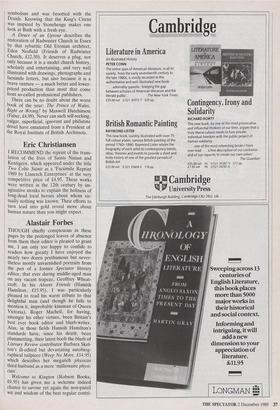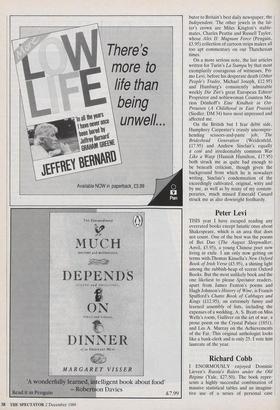Alastair Forbes
THOUGH chiefly conspicuous in these pages by the prolonged leaves of absence from them their editor is pleased to grant me, I am only too happy to confide to readers how greatly I have enjoyed the nearly two dozen posthumous but never- theless mostly unvarnished portraits from the pen of a former Spectator literary editor, that ever daring middle-aged man on any vacant trapeze, Geoffrey Wheat- croft. In his Absent Friends (Hamish Hamilton, £15.95), I was particularly pleased to read his warm tribute to that delightful man (and though he fails to mention it, improbable kinsman of Queen Victoria), Roger Machell, for having, amongst his other virtues, been Britain's best ever book editor and blurb-writer. Alas, in those fields Hamish Hamilton's standards have, since his death, been plummetting, their latest boob the blurb of Literary Review contributor Barbara Skel- ton's ill-edited but devastating autobiog- raphical tailpiece (Weep No More, £14.95) which describes her megarich physicist third husband as a mere 'millionaire physi- cian'.
Welcome to Kington (Robson Books, £9.95) has given me a welcome indeed chance to savour yet again the non-pareil wit and wisdom of the best regular contri- butor to Britain's best daily newspaper, the Independent. The other jewels in the lat- ter's crown are Miles Kington's stable- mates, Charles Peattie and Russell Taylor, whose Alex II: Magnum Force (Penguin, £3.95) collection of cartoon strips makes all too apt commentary on our Thatcherian times.
On a more serious note, the last articles written for Turin's La Stampa by that most exemplarily courageous of witnesses, Pri- mo Levi, before his desperate death (Other People's Trades, Michael Joseph, £12.95) and Hamburg's consistently admirable weekly Die Ziet's great European Editor/ Proprietor and noblewoman Countess Ma- rion DOnhoff s Eine Kindheit in Ost- Preussen (A Childhood in East Prussia) (Siedler, DM 34) have most impressed and affected me.
On the British but I fear debit side, Humphrey Carpenter's crassly uncompre- hending scissors-and-paste job, The Brideshead. Generation (Weidenfeld, £17.95) and Andrew Sinclair's equally a cote and irredeemably common War Like a Wasp (Hamish Hamilton, £17.95) both struck me as quite bad enough to be beneath criticism, though given the background from which he is nowadays writing, Sinclair's condemnation of the exceedingly cultivated, original, witty and by me, as well as by many of my contem- poraries, much missed Emerald Cunard struck me as also downright foolhardy.











































































 Previous page
Previous page